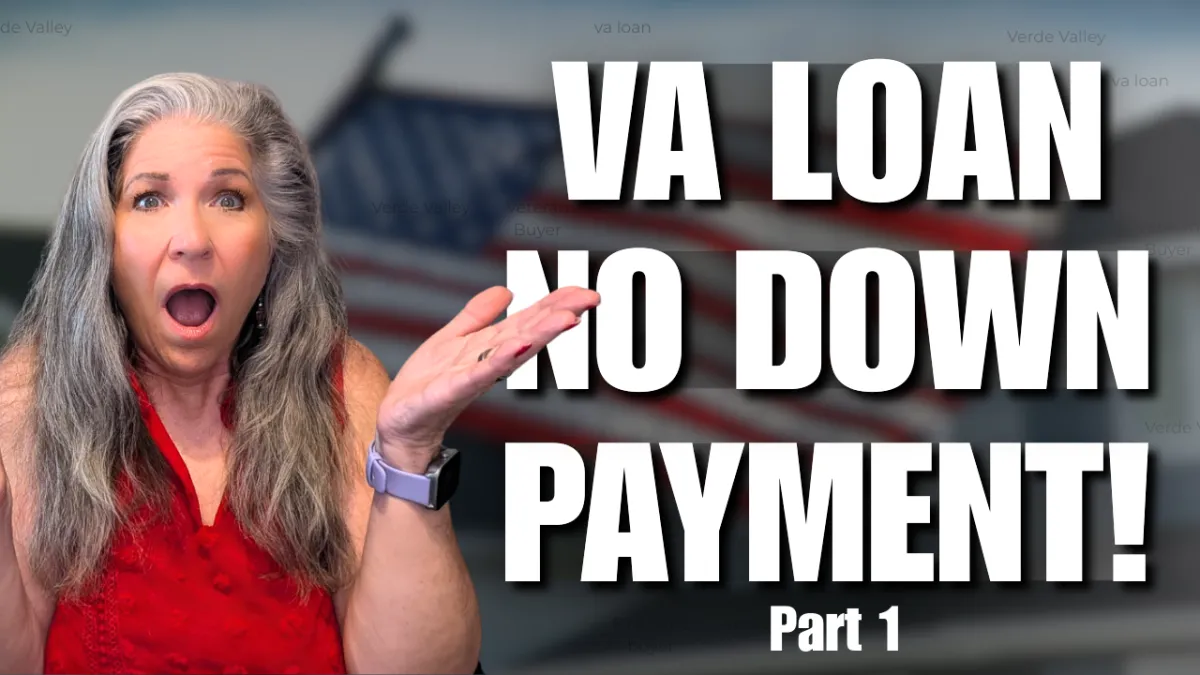
VA Loan Explained: What Sellers & Buyers MUST Know Part 1
👉 Watch the full video on YouTube!
Prefer to listen? Click to hear this post!
VA Loan Explained: What Sellers and Buyers Must Know Part 1
[00:00:00] Hey, if you are a veteran, stay tuned to today's episode. Today I am going to be interviewing a local lender, talking specifically about VA loans.
Hi, Kellen. Thank you so much for, meeting with me today. And today we are going to be talking about VA loans. Yay. VA woo, woo, woo. Exactly. My favorite. My favorite. And, Kellen, is one of the lenders that I work with locally here. I love to refer to him. He is so awesome at just being there for you.
Like he will literally hold your hand through the whole process. And, and I'm gonna tell you just a quick story. He and I just closed with some clients on a VA loan, and he and I worked with these clients for over two years because they had some credit repair issues. And they followed through. [00:01:00] They did what they were encouraged to do.
There was a credit repair program that Kellen hooked them up with, and they just closed on their first home three weeks ago now, I think. Yeah, the very end of August. And they're so excited. And Kellen, they could not say enough good things about Kellen and how he just. Walk them through the process.
And yes, they were very anxious 'cause they were first time home buyers. And yes, all first time home buyers are really, really anxious. So that's why we wanna bring this information to you so that maybe you get some answers. And of course reach out to Kellen, 'cause he will take you through the process.
Okay. So anything. Wow. Thank you. I just wanna say thank you. It's not like you were just describing yourself holding hand through the process. Being there every step along the way. So I, I really appreciate that and I'm glad that you brought that up. 'cause that was a really, really cool story. Maybe we can talk about that later on.
Yeah, [00:02:00] yeah. Yeah. I think that would be great that we, and I, I do like to refer to specific experiences I've had with people because it's not, it's not, everybody is unique and different and some are way more challenging than others. so one of the things that we will touch on is. As we're going through the questions and answers, I will be sharing examples.
I encourage you to do the same. We all love stories, especially good ones, right? Not the bad ones, but there are some bad stories that don't end well. So with that being said, let's just start to start with the basics. Who qualifies for a VA loan? Great question. And the basic answer is anybody that's been
in the military or anybody that is a veteran, there are some guidelines around that as far as you have to be honorably discharged. You have to [00:03:00] be get your certificate of eligibility after you are either with the military for a certain time period. But yeah, members of the reserves, you can be in the reserves or active duty.
And the easiest way to find out is when we're talking with a client, the VA's got a very slick portal where we just plug in an individual's information and it will tell us if they're eligible or not. And so that's a basic way. One part that people don't tend to think about is a surviving spouse of a veteran who's also eligible for VA financing.
Right. I actually have two sisters that I worked with and they're absolutely wonderful. I started working with them. Oh my goodness, it's maybe almost three years ago now. And I've stayed in touch with them. We have lunch like every month almost. And they are both surviving [00:04:00] spouses of a veteran and so they were able to pool their resources and get a VA loan to buy a home together.
Wow. That's awesome. And I just wanna say what a common thread for yourself. Staying in touch with your clients and really having that compassionate guidance for if somebody's not ready right now, it took this, these two widows three years and this other family that we just closed the loan on two years.
And so just kudos to you for doing that. Oh, thank you. Thank you. Is, oh, quick question. It's a surviving spouse, not children of a veteran, correct? Correct. Yeah, just clarifying that. Are there any special benefits to buyers who do use a VA loan? Yeah, VA loan is one of the most competitive, best products on the market for buying a home.
And the reasons being, there's no down payment [00:05:00] requirement, so you can put zero down. And then there's not any mortgage insurance. Usually with a government program, FHA, USDA, you've got mortgage insurance or conventional, you're putting less than 20% down. So that really cuts down on the cost.
Those are at least financially some really good benefits of going the VA route. Okay. Are the, VA loan interest rates better? About the same, worse, I'm just saying than conventional or FHA or USDA loans? Yeah. It's interesting because the, they will generally follow the market of however the market's moving with interest rates.
What we've seen just over the past, maybe year or so, is that they've been pretty comparable to conventional pricing when it comes to interest rates. [00:06:00] So give or take, maybe an eighth of a percent, you might have slightly better interest rates on an FHA or USDA loan. But you're not having to pay the mortgage insurance, on a VA loan, but still very competitive. Next part is, I think, something that a lot of first time home buyers use, whether they're veterans or not, but in this case, I work a lot with veterans, and you just already said that they can take a hundred percent loan on the purchase price of the property.
This is kind of an important piece because the next thing I'm gonna ask about is seller concession. And what are the parameters around that and what does that mean and what does that pay for? Yeah, so it's incredible with the VA loan that. With seller concessions, you can come into buying a home with no money out of pocket, [00:07:00] which is just mind blowing.
And the reason being is you can finance, like you said, a hundred percent of the purchase price with the VA loan and then seller concessions. What that is for anybody that's unaware is it is gonna be money from the seller that the, they give to the buyer towards closing costs. And VA in particular has some really cool ways that you can use those, seller concessions as well.
But generally, when people think of seller concessions, they think of closing costs. So you can go up to 4% of the purchase price. So. Let's say your purchase price is 400,000, you can get, get $16,000 in seller concessions, and I have the list pulled up of what items you can use the
seller concessions for as well. At [00:08:00] least I did a second ago. We'll see if I find it again. Okay, here it is. So for seller concessions, you can use that to go towards, improvements on the house appliances, furnishings. You can pay for the VA funding fee, which we will chat about in a little bit. It can be prepaid for HOA taxes insurance.
It can buy down the interest rate either temporarily or permanently. Then one that we did just two months ago is we helped lower pay off some debt with the seller concessions that the buyer had. So it's much more versatile than any other type of loan. Okay. And also kind of a caveat or continuation of that couple of things.
Is that they can also use seller concessions to help pay for their buyer's agent's [00:09:00] compensation. And that was something that was not allowed a year ago because of the va, did not want, doesn't want, how do I say this? They're very protective and I think this is awesome and that's why, I mean, I work with veterans.
Probably 90% of my business is veterans. I live in a very veteran friendly community and, excuse me, so the VA did not want veterans having to pay the compensation to their buyer's agent, and that was kind of a thing that they had to go around and come up with an answer because previously they could not use the seller concessions to help pay their buyer's agent compensation, and now they can correct.
That is right, and that was such a game changer when that came out. It then allowed the veterans to look at homes that maybe. [00:10:00] The sellers weren't previously offering to pay for the buyer's agent commission, which you could have done anyways, but it there was less incentive. So it opens up the market. So it's equal playing field amongst all the loan, programs. Correct. Correct. And the other thing I wanted to say about that is that my understanding is, is that if there is money left over from the seller concessions that they didn't need for closing costs, they didn't wanna use it for buying down points and they didn't need it to pay their buyer's agent, they could potentially get reimbursed for upfront costs, like the appraisal, termite inspection, home inspection and any other like.
Required inspections and things prior to closing. Is that correct? Right. Yep. You got it. Right. So this is truly one of the programs that you can get into a house with no money out of pocket. Excellent. So it's, I [00:11:00] mean, that is key right there. And I think that, let's talk about that for a minute. Okay.
Because I know that sometimes. So I've heard, I have not personally experienced this, but I've heard it from listing agents that sellers, when they look at an offer from a veteran with a VA loan, or it could be active duty or a family member, but the person, the buyer is coming in with a VA loan and they are
a hundred percent loan, so they're not bringing any down payment and they are asking for seller concessions, which means we figured there's no money they're gonna be bringing to closing, that they're gonna get into this house. Without bringing any money to the table. And I have heard that there are sellers that think that if you can't afford any down payment and you can't bring money for the closing costs, you really shouldn't be buying a house and they don't wanna consider those [00:12:00] people.
Can you speak to that? Yeah. What the reality is about. They are qualified for the loan, meaning they can't buy the house Right. Without qualifying. So can you speak to that a little bit? Yeah. It's a kind of a bias. Yeah. It, when sellers look at that, in that sense, it's really biased thinking, all right, they're not bringing any money down, therefore they're gonna be a bad.
Buyer of this house, the transaction's not gonna go smooth. But anyone like yourself and myself who work with a lot of veterans, they, there's no. Not any other issues that come about than any other type of loan and the, like you were saying, individuals are pre-qualified off of their income already. So the, the benefit of going with the VA loan is that there's no down payment, but they are [00:13:00] well-qualified when it comes to their employment stability, their income, their credit. So we look at all those things, including. Residual income, which is an extra layer that the VA has us analyze as lenders. To make sure that after their monthly payment, they're still, they're not gonna be house poor, they've got money for gas and food and other things. So it's almost, if you look at it in that sense, you've got a stronger buyer than you might with a conventional loan.
Or if somebody came in with an FHA or USDA loan. Okay. That's good to know. That's, I like that. I like that. The other thing is, and you just made me think of it as you were talking about it, is that. If they are coming in, and here's typically, this is what I do when a client is wanting to buy a house and they're qualified for X and we know that they need to ask for [00:14:00] seller concessions, we're gonna offer full price or more.
Obviously it need to comp out for that. But we're gonna make up to that seller. The difference that we're asking the seller to give back in seller concessions. We're not asking the sellers to give up their house, and the client that is the buyer that's making that offer has already been qualified, pre-approved for
that amount that they're offering the seller. So as you already said, their income has been checked, their taxes have been checked. A lot of these veterans have residual. They have continual income from a VA pension. And so they not only have their income that they're working or whatever, but they have a VA pension that is also there to supplement their regular income.
So that's something that I think sellers need to understand is that we're not coming with a bad offer. We're [00:15:00] probably oftentimes coming with sometimes a better offer because. They are qualified, we're gonna offer you more to make up for these concessions, and they're solid. I mean, I have to say working with veterans has been a blessing because they are the most reliable, follow through, honorable people of integrity that I have ever worked with when it comes to buyers and sellers.
You got it. And I think as you were talking, I was thinking, why is it that they get a bad rap when a seller gets an offer from a VA with a VA prequalification letter? And I think that there's a, the misconception that the house is gonna be scrutinized so much more than if it was maybe on a conventional loan or FHA and the real, the main.[00:16:00]
Differentiating factors between a VA appraisal and the let's say just a conventional appraisal, is that they're gonna be looking for no peeling paint, no peeling lead paint, no broken windows, which are very, you know, what convention would be looking for as well. The only other thing is that the VA requires a termite inspection.
And so I think that there's the misconception that, oh man, like the VA, they're gonna scrutinize everything when it comes to my house. I'm gonna have to change my floorboards and you know, redo my roof. But it's really the main thing is gonna be a termite inspection. If it comes back as negative, it just needs to be treated and then we proceed as normal and close along.
Right, right. It's funny that you started talking about appraisals because we have a specific interview that I did with a home inspector, we just [00:17:00] finished it. It's just being, it's, it's up on our YouTube channel that people can go in there and we talk in detail about the items that could make a home fail, a VA appraisal.
And they're really looking at wanting the veteran to move into a home that is. Safe and is going to be not something that they're gonna be house poor and can't fix. They cannot get, and, and you can confirm this for me, they cannot buy a fixerupper, right? Yeah. You can buy a house that needs remodeling, that's fine and updating, but you cannot buy a fixerupper.
And that's kind of frustrating for front, for some of our veterans because they're handy and they wanna fix it up themselves and whatever, but they can't. It has to no peeling paint. No, no sketchy decks or railings. Broken windows. Flooring. It has to have flooring in every room. And if there's things that are like trip hazards or tearing up [00:18:00] quite a bit like it's ripped up carpet, they could call that out.
'cause it's a trip hazard Potentially so the peeling paint and the windows are the most common ones that I see called out and in the interview with the home inspector, and I've talked about this in other videos, and we'll put those in so you guys can link to them, is how can the seller prepare for that and how is the home inspector gonna help?
And what are the options, you know, after you identify these things, how can we fix it to keep this, buyer and seller moving forward to closing? And there's always solutions. There's always solutions, you know? Yeah. The goal is. The buyer wants the house, the seller wants to sell it. We got a qualified buyer.
Let's make this happen. Let's make this little, you know, partnership work and everybody walks away happy. That's our goal. Right? That's our goal for them. Exactly. Yeah. Okay. Cool. Cool. Anything else about [00:19:00] appraisals? Because, ah, there is one thing. I have it, it's my next little topic here. This one comes up.
This is unique to VA loans. Tide water. Let's talk about tide water. Tide water. Let's talk about it. Oh yeah. Let's talk about tide water. 'cause that's definitely very specific to VA loans. And I'm gonna tell you, if you do not work on VA loans a lot, and this happens and you happen to be a listing agent, you can lose your mind.
Or a buyer's agent, you're like, what the hell does that mean? Sorry. Right? Yeah. You know? So let's talk Tide water. Yeah, but sometimes a VA appraiser feels that a home might not appraise for the purchase price. So before finalizing the appraisal, they trigger the tidewater process. And how that works is the lender notifies the realtor yourself, who then has 48 hours to send in comparable sales to help support the value.
[00:20:00] And why it's good is it gives the buyer and the realtor a chance to make a case before the value is set instead of being surprised after the fact. 'cause on a normal purchase. You'll get the appraisal back with no heads up that, hey, this is gonna come in below what the purchase price is, so It's nice that you're given that little wiggle room of, all right, let's figure something out.
Let's show some comps that maybe the appraiser didn't call out or see. Right, right. And I've had quite a few of those in the years of doing VA loans. And to be honest, most agents do not know what that is. They don't. They have no clue and they do freak out. I will say that the first time it happened to me, I was like, what is this?
I've never, you know, but, but since I have done so many, the, it, it's great. To be able to have that option. It's not an option on any other loan. The downside of it is [00:21:00] that you don't know how short the appraiser is from the purchase price. It could be a dollar, god forbid, or it could be thousands and thousands of dollars.
And so typically the buyer's agent and the listing agent get together and we try. To talk about what comps did you use to come up with the list price and look at what's currently happening since maybe the house went on the market. And then we send those to you, the lender. I think we have to write it out.
There's like a form now that they want us to fill out. So we fill that out, send the comps, and pray for a good outcome because. If Tide water happens, we don't know how off it is. Now, I will say sometimes it works and we are able to get the appraiser to appraise the property based on, you know, the new information we shared and it appraises for the purchase price, which is [00:22:00] what we want.
However, when it doesn't appraise for the purchase price, just like every other loan, this is another piece of the process. And you know, I'm not gonna get into it, but if it doesn't appraise, we have a whole nother conversation that's for another video. But it is unique, the Tidewater to VA loans and it's really a good one because most of the time.
It, it, we can get it where it needs to be because obviously, again, the buyer wants to buy the house, the seller wants to sell the house. Let's make this come together and make everybody happy. So, you know, I am thankful for the tide water, even though it's very stressful. It is, it is. We don't get much time to work on it, so,
So, it's, it does, it does kind of stress us out a little bit. Let me see where we're at. Okay. So I think that's why, I think that's why it's so important to be working with an expert [00:23:00] like yourself that has experience with that. So when it comes up, there's no hesitation. You know what to do. You take care of it, you get it done.
So, yeah. Yeah. I don't like it. Just a plugin for it. I get it done because I know what I need to do. Um, right.
I know that we covered a lot of basic items in this first half of the interview on VA loans. However, there are some really cool tips and tricks and information even I didn't really know coming up in part two. So click on the thumbnail and watch part two.
💡 Ready to take the next step?
📘 Grab our free guides to help you make a smart purchase:
🎯 Selling your home is a major milestone — and the right guidance can make all the difference.
📘 Grab both of our free guides to help you feel confident, informed, and ready to sell faster and smarter:






